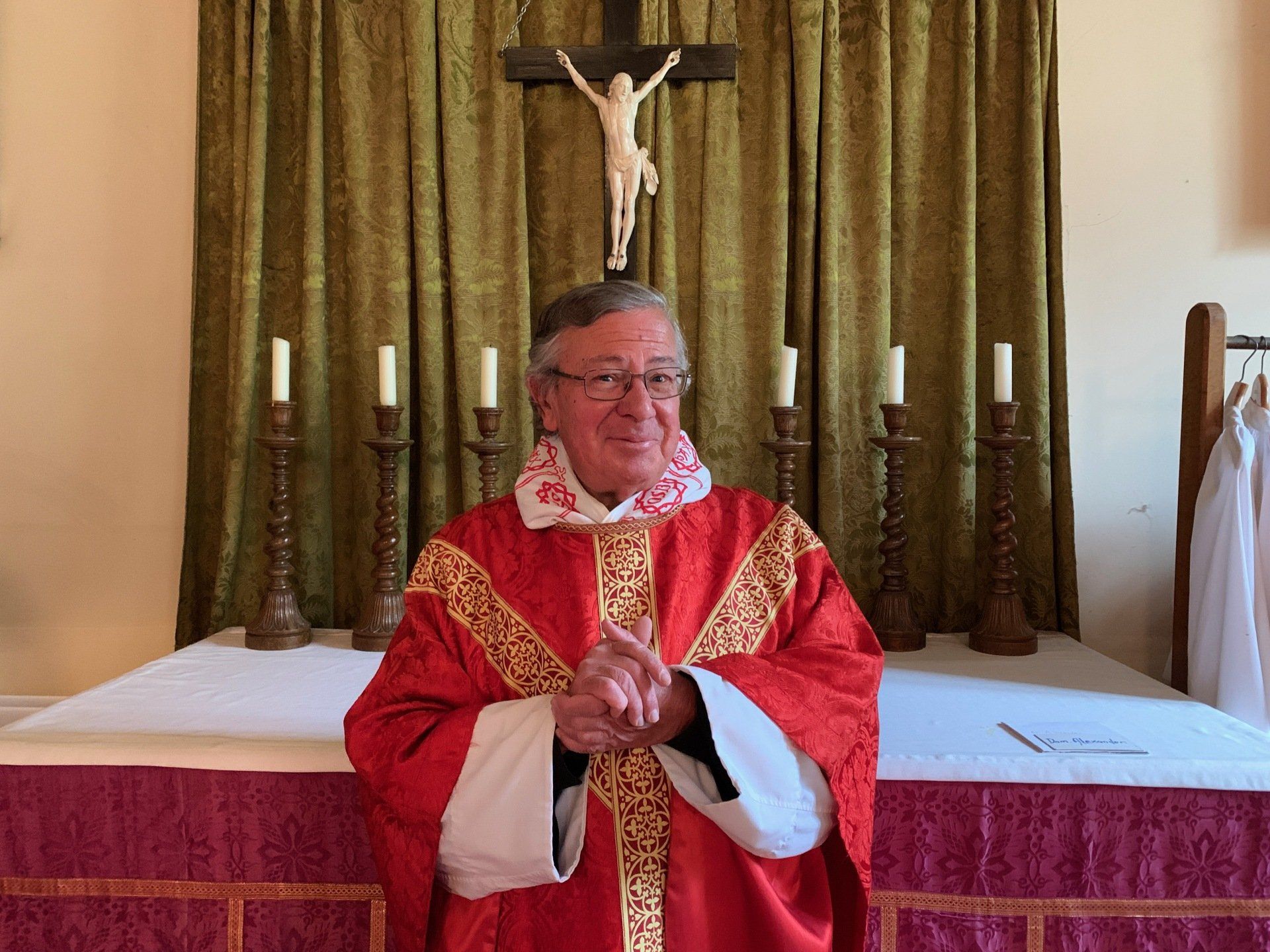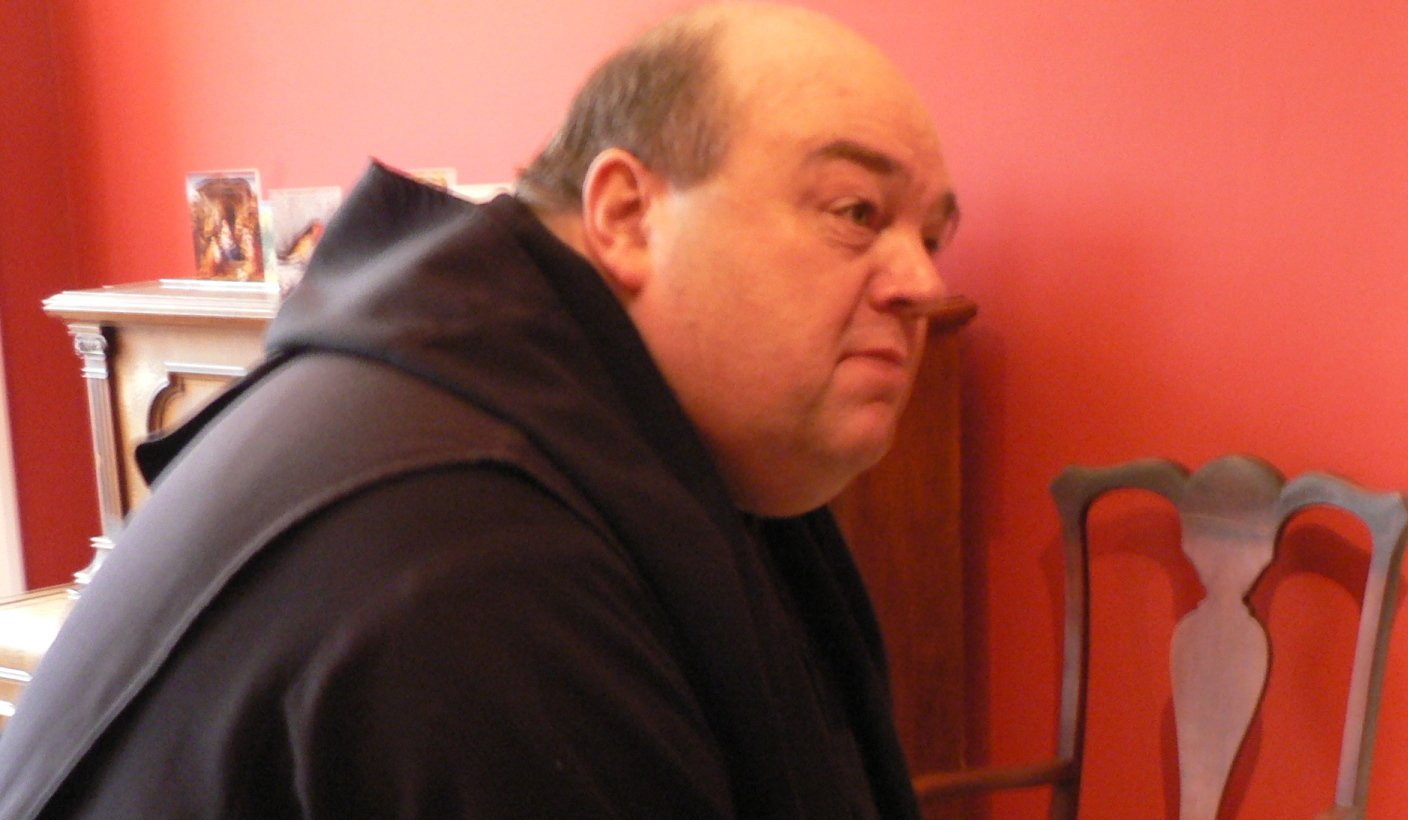Deceased Monks
Deceased Monks
Belmont Abbey Hereford
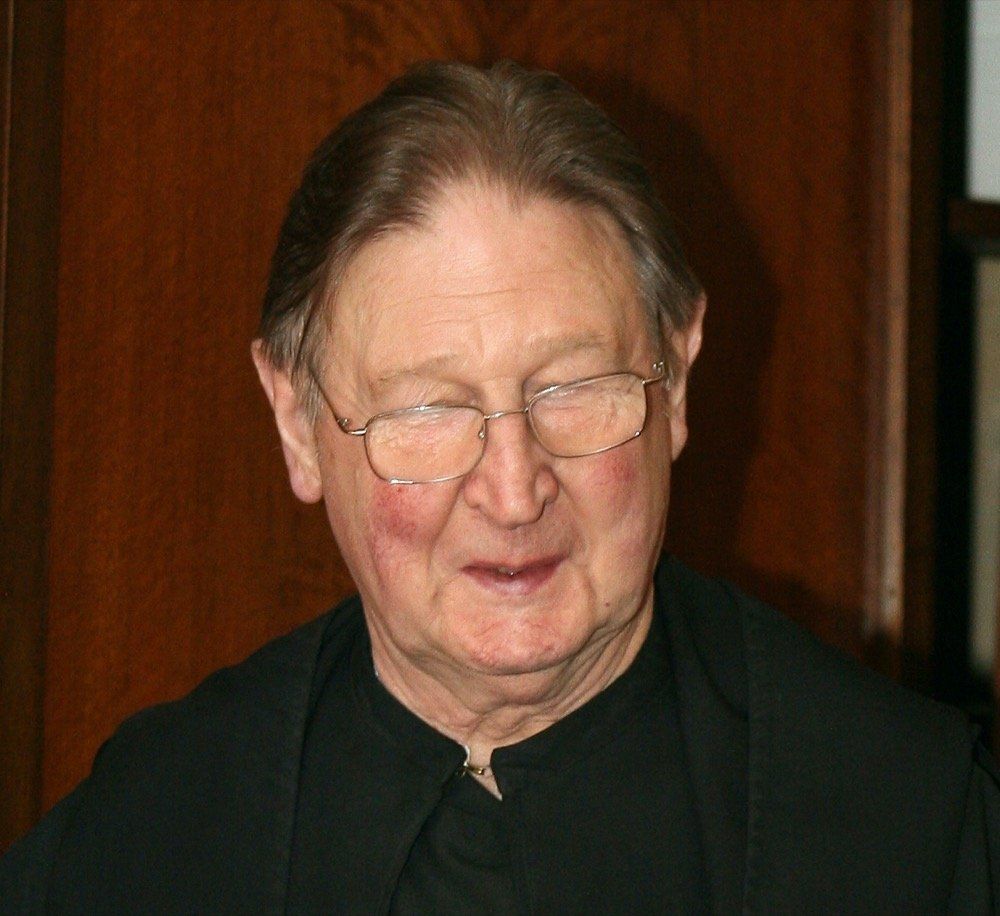
By Fr Brendan Thomas
•
27 Dec, 2020
Please pray for the repose of the soul of Dom Raphael who died on 7th April 2020, just short of his 89th birthday. John James Aspinwall was born near Preston on 4th December 1931, the son of Joseph and Margaret Aspinwall. His elder brother Gerard was a Salesian priest, so John was sent to school with the Salesians at Shrigley Park, near Macclesfield. He then studied at Trinity College, Dublin, obtaining an M.A. In English Literature, a B. Mus. and a Dip. Ed. He also studied for an A.T.C.L. at Trinity College, London. In addition he took his City and Guilds in Furniture Studies. Highly professional in all that he did, John was a brilliant pianist and composer and a sophisticated furniture maker and designer. He taught English and Music first at Shrigley Park and then at Prior Park, near Bath, a city which he loved and where he made his home. He also taught music at Stonor School. From 1980 onwards he was self-employed in the world of quality furniture and antiques. He came from an old Lancashire Catholic family and was deeply religious, but in a very personal and idiosyncratic way. He was attracted to the Benedictine way of life and tried his vocation at Quarr. Perhaps the life there was too austere, so in 1994, at the age of 63, he came to Belmont and was clothed in the habit on 20th March 1995 and given the name Raphael. He soon found himself at home here and made his Solemn Profession on 15th March 2000. He was Sacristan from 1996 to 2000, Guestmaster from 1999 to 2001, Librarian from 2000 to 2005, Refectorian from 2003 to 2019, Organist from his arrival at Belmont until his death and, for many years, he served the Community as Secretary of Chapter with the most exquisite good humour. As Refectorian he showed particular care of the brethren, making sure they never lacked for anything they might need. He designed the organ screen for the organ extension in the North Transept. He composed several pieces of music for Hereford Cathedral including a poem by Thomas Treherne. Although softly spoken, he had a wicked sense of humour and could see the funny side to most situations. He was a delight to be with, a man of great learning and knowledge and an astute judge of character. He did not study Theology formally, but read a great deal and although he was at heart quietly traditional, he was not afraid to venture out and read the works of rather more unorthodox theologians. He had a good collection of interesting theology books, which are now in the monastery library. He remained active and youthful to the very end of his life and never looked his age. With Raphael you never felt that you were in the company of an old man. Unfortunately, he contracted Covid-19 locally and died in Hereford Hospital on 7th April 2020. Sadly, we were not allowed to visit him and he was not allowed to return to Belmont to die among his brethren, something he dearly longed for. This experience was very painful for his family as well as for the community. Even his burial had to be held in private. A man who did not like fuss, perhaps he would have preferred it that way. May he delight the angels and the saints in heaven. A private graveside burial was held on Tuesday 14th April. Sadly only members of the community could be present, following the social distancing restrictions laid down by the government. We hope to have a Requiem Mass for him in the autumn so that friends, family, and parishioners can come together.
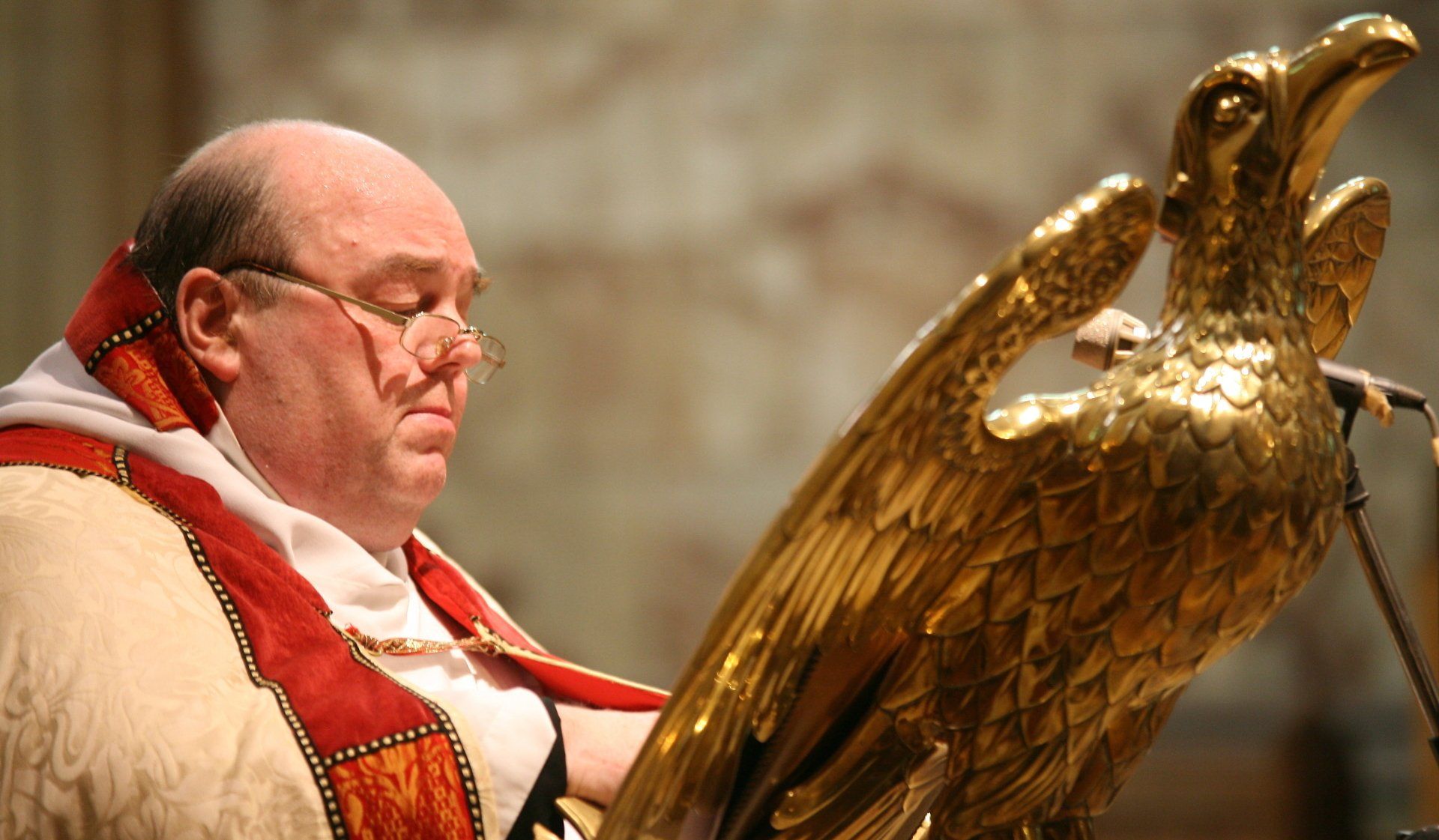
By Abbot Paul Stonham
•
25 Sep, 2020
Requiem Mass for Dom Bernard Wassall St John’s Gospel ends with these words, “But there are also many other things that Jesus did; if every one of them were written down, I suppose that the world itself could not contain the books that would be written.” (Jn 21: 25) These words could easily apply to Br Bernard, whose Requiem Mass we are celebrating this morning. How do you fit Br Bernard into a short homily? Each one of us here present, his monastic community and family, as well as all those participating on our websites and Facebook pages, could write a book with our own story of Br Bernard, the Bernard we knew and loved, but even then the story of his life and achievements would leave much to be written. Our Gospel passage this morning also comes from St John (Jn 12: 23-28). Jesus assures his disciples that there will be a place for them in his Father’s house. “Do not let your hearts be troubled. Trust in God still, and trust in me.” Br Bernard was a man of faith and strong convictions, whose heart was never troubled with doubts. He always trusted the word of Jesus. This faith, of course, he learned at home with his beloved parents, Betty and Paul. As a result, he was prepared for that final moment when the Lord would call him: he believed what Jesus, the Way, the Truth and the Life, had promised, “I shall return to take you with me; so that where I am you may be too.” Br Bernard was born at Barrow-in-Furness on 20 th August 1956, the only child of Paul and Elizabeth Wassall. He was baptised William Paul and was educated at Our Lady’s Convent Prep School, St Mary’s Junior and St Aloysius Senior School. He was talented in manual crafts and took City and Guilds in carpentry. He first visited Belmont for a vocations’ week at the age of 15. Seven years’ later he returned to try his vocation and was clothed by Abbot Jerome on 24 th October 1978, taking the religious name Bernard in honour of the great Cistercian saint on whose feast day he was born. He made his First Profession on 1 st November 1979 and his Solemn Profession three years’ later. He was only the second monk in Solemn Vows at Belmont, the first being Br Peter, who came to be a choir monk without going on to the priesthood, a return to the true monastic tradition encouraged by the reforms of the Second Vatican Council. Br Bernard’s life and vocation were focussed on the monastic life, on being a monk, which he was to the core of his being. In the course of his monastic life, he fulfilled a long list of positions and duties, being a highly gifted, knowledgeable and spiritual person. He began by redecorating St Raphael’s Chapel and acting as assistant bursar. He taught Divinity and Woodwork in the school. From 1984 to 1986 he was Housemaster of Kindersley, where he was much loved and admired by the students. He was Sacristan from 1983 until 2001 and Master of Ceremonies from 1996 until 2001. In 1986 he was sent to Llanarth Court to help with its closure as a prep school prior to its sale. He then returned to teach at Belmont until the closure of the school in 1994. It was Bernard who in 1992 helped set up the shop in its present form, a ministry rather than a business venture, that he continued to supervise until 2018. He was full of wonderful ideas on how best to serve the wider community, share the Catholic faith and preach the Gospel in different and exciting ways. He wanted to make the Benedictine life better known to the general public and he was keen to work with all those who were willing to work with him. He was the driving force behind so many of the projects that have taken place at Belmont since the school closed. He was fully involved in the programme of school visits, having a wonderful way with children. He organised volunteers to offer guided tours of the church and worked with the Heritage Lottery Fund to help produce the new guidebook. Bernard was the brain behind the annual pilgrimage in honour of Our Lady, sadly cancelled this year because of the Covid-19 pandemic. From 2001 until 2015 Br Bernard was the monastic Infirmarian, looking after many of the brethren and preparing them for death. He would sit up all night with the sick and dying, chatting, praying, singing and joking with them. He assisted with our oblates until 1993 and was Oblate Master from 1993 until 2003 and again from 2009 until the day he died. He was much appreciated for his extensive knowledge of monastic history and customs, for his spiritual insights and for sharing with our oblates news of the community and of other monasteries. There was nothing he didn’t know about nuns and their habits. He was an outstanding calligrapher and produced cards and certificates for every occasion. In fact, he could turn his hand to anything from making and repairing rosaries to producing the most outstanding floral displays our church has ever seen. He was, of course, larger than life and, invariably, the centre of attraction because of the charity and wisdom that flowed from his lips and heart. He loved chatting with friends and strangers alike and people always sought his company and companionship. He is irreplaceable. Can you imagine Belmont without Bernard? I can’t. He was the one you turned to for advice and information. It was he who knew the traditions of the house and made sure that the rest of us learned them. If you were sad or disenchanted, then Bernard would rekindle your heart with joy. If you wanted a singsong or a moment of nostalgic reminiscing, then who else would you turn to? He knew the words of every song ever written in the English language and could do an amazing job in Polish as well. He loved his parents and family and he loved his hometown. He was a proud Lancastrian through and through and never accepted the insult of Barrow being attached to Cumbria. At the end of August he went home to help arrange his mum’s care package after she had been in hospital. He was blessed in spending his last week with her, though he never forgot to ring his friends and brethren every day: Br Bernard invented ministry by telephone long before lockdown. Back in April he had been in hospital with quite a serious case of Covid-19 but returned to Belmont on Holy Saturday. He never really got over the after effects. He slowed down notably, had difficulty in breathing and became practically immobile. He was struggling, and, as ever, tried to put on a good face, but we could see he was suffering. Thus it was that he collapsed and died of a heart attack at home on the morning on Saturday, 5 th September. St Paul wrote to the Romans (Rm 6: 9), “We believe that having died with Christ we shall return to life with him: Christ, having been raised from the dead, will never die again. Death has no power over him any more.” This is our Christian faith. This is what we believe. May our Br Bernard enjoy the company of the saints and angels in the kingdom of our heavenly Father where “death has no more power over him”. May he rest in peace. Amen.
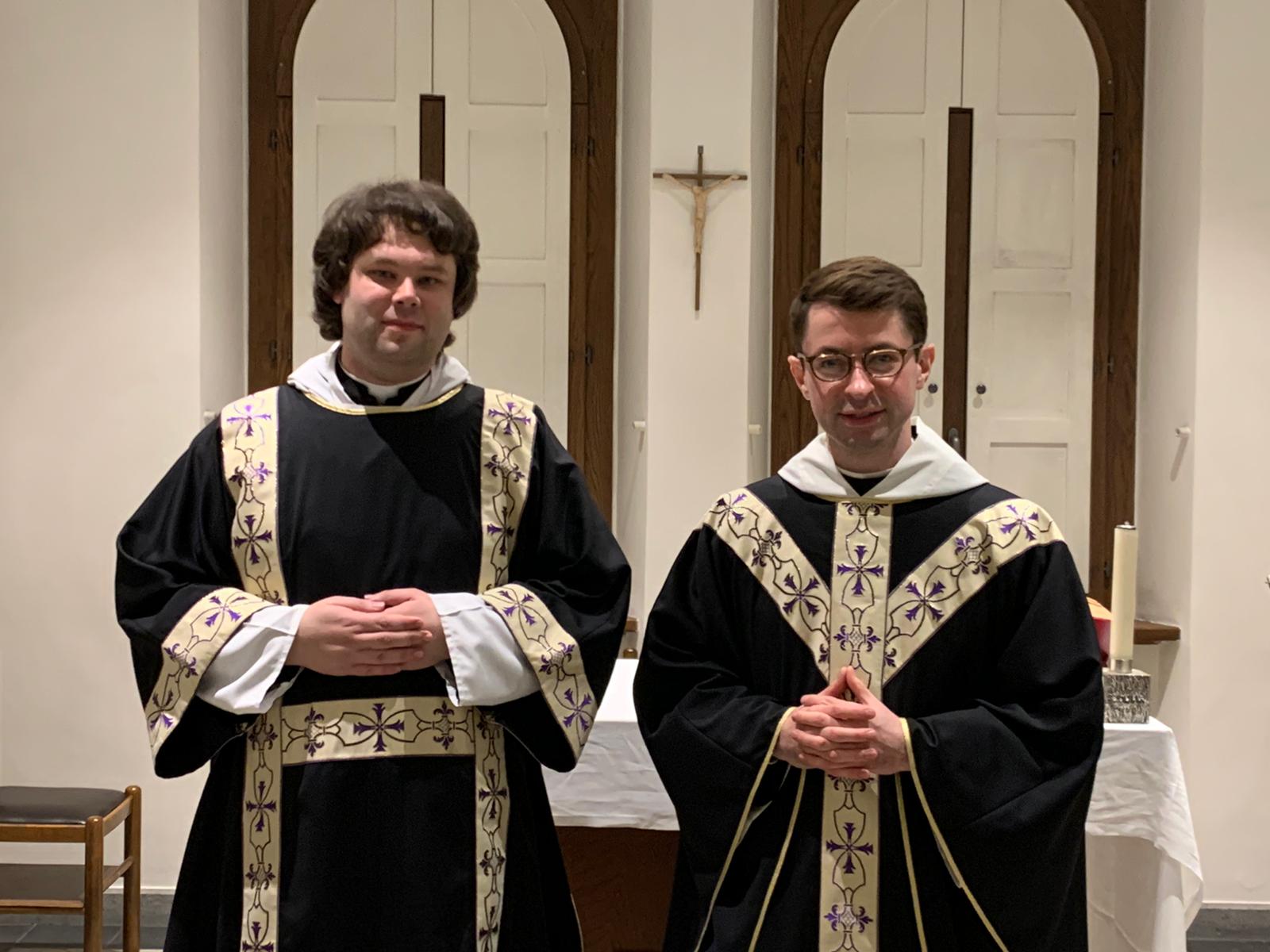
By Belmont Webmaster
•
03 Feb, 2020
On the day of Dom Alistair's funeral, a Requiem Mass for him was celebrated in Rome at Sant' Anselmo where he lived and studied. He completed a Baccalaureate in Theology and undertook studies in the Monastic Institute, studies he thoroughly enjoyed. As well as the studies he played a prominent part in the student life, being elected to the Senior Council of the College. Here are some photographs of the Mass. Dom Augustine, who is studying in his final year, assisted as deacon..
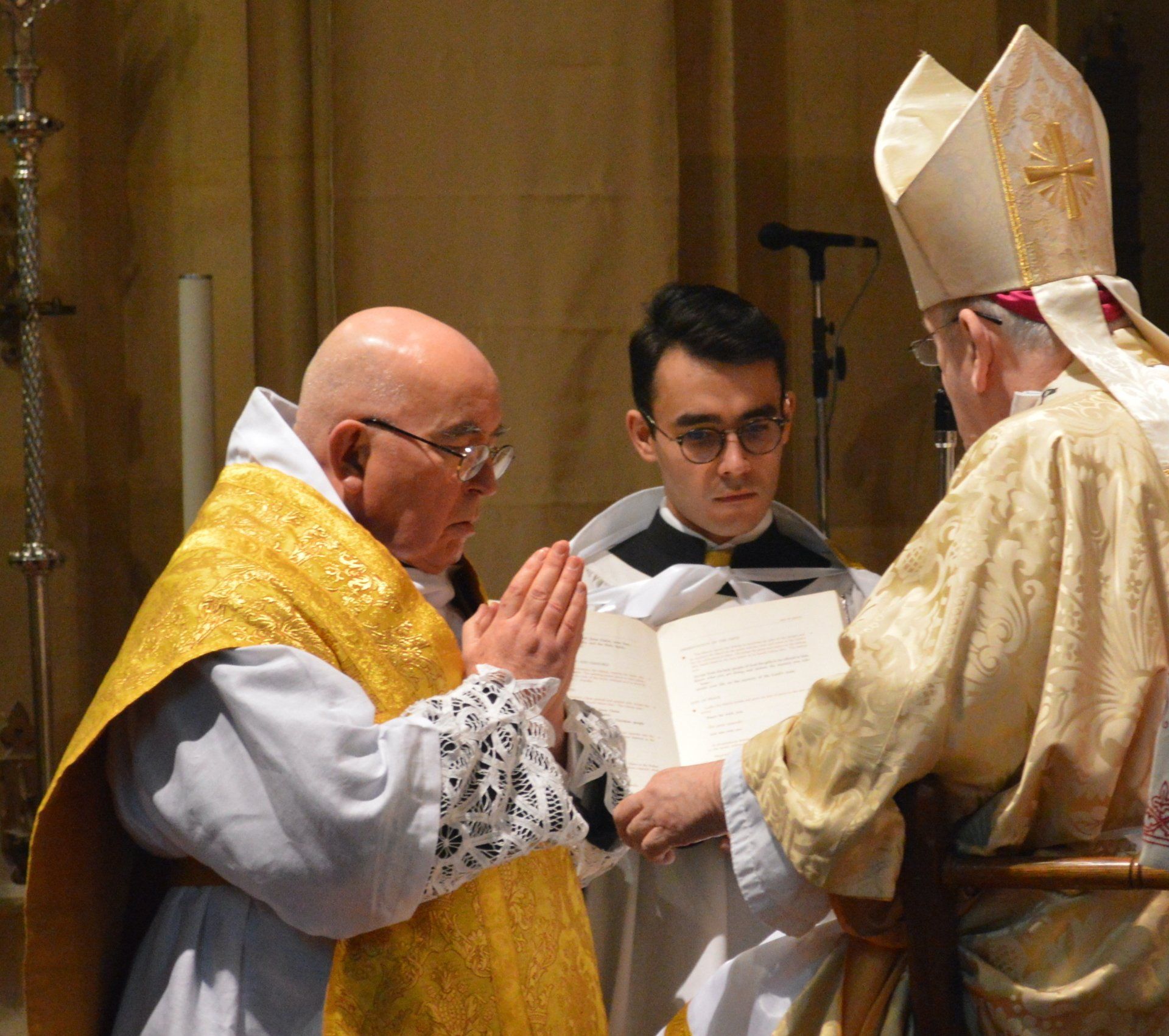
By Belmont Webmaster
•
30 Jan, 2020
Abbot Paul's Homily from the funeral is below: “Do not let your hearts be troubled. Trust in God still and trust in me. I am going to prepare a place for you; I shall return to take you with me, so that where I am you may be too.” On 15th January, Fr Alistair made his way to his room after Morning Office, taking the lift, as he always did, to the second floor, then walked along the corridor. As he placed the key in the lock, he suffered a massive heart attack and died. To all of us it came as a terrible shock. We knew that last Summer he had undergone surgery at Worcester Hospital and returned to Hereford Hospital from time to time for a check up and that he took time off to rest when needed. But he continued to work hard, especially at his pastoral duties, and never intimated that he was as unwell as he knew himself to be. Almost as an act of faith, he continued to eat rather unwisely and made no attempt to live a healthier lifestyle. He took literally those words of Jesus we have just heard, “Do not let your hearts be troubled. Trust in God still and trust in me.” He knew that he could die at any moment and that the Lord would return to take him that he might be with Jesus in the Father’s house. He was not afraid to die, for he believed the Lord’s word. Every step was an act of faith. His sudden death was truly symbolic of the Christian life: we have been given the key to the door that leads to eternal life; we can put the key in the lock, but only God can open the door and let us in. Alistair Findlay was born on 19th August 1955 in North Shields, Tynemouth, the only child of William and Joyce (née Archer). He was very proud of being a Geordie and retained a great affection for the place of his birth, as well as for the Northumbrian saints, especially St Cuthbert. He was baptised at Dunston Hill Methodist church, but confirmed as a teenager in the Church of England. He studied at the Priory Primary School, Tynemouth, and then at Tynemouth Grammar Technical School, where he took his A levels in 1976. This was followed by 3 years at the College of the Venerable Bede, Durham University, where he trained as a teacher, receiving a Certificate in Education. After teaching practice at Gaywood Park, King’s Lynn, he lived with the Taizé Community in France for two years. This was his first experience of monastic life and one that he would cherish for the rest of his life. Here he was also able to perfect his knowledge of the French language. On his return to England, he taught at Coventry Blue Coat School from 1979 to 1988, when he took up a post at St John’s Preparatory School, Enfield, North London. This was followed by two years at Haileybury Junior School, Windsor. Finally, in 1993, he took up his last teaching post as Assistant Headteacher at Topcliffe School, Birmingham, where he would remain until 2010. He was, of course, an excellent teacher, a true professional, who is remembered for the clarity of his expositions in the classroom and the charitable and fatherly way he treated his pupils. You might be surprised to learn that among the many roles he took on, he also coached rugby. Ever since his time at Taizé, where, in addition to running youth meetings, he was also in charge of catering – he was a first class chef, but never got the chance to share this talent at Belmont – ever since Taizé, he had been contemplating the possibility of some sort of Christian community life. At the same time, his faith deepened and matured as he devoured books on every aspect of Philosophy and Theology. He became very learned in the things of God, that spiritual journey to which the Lord invites each one of us. This prayerful reading gradually led him to think seriously about becoming a Catholic. After the necessary preparation, he was received into Full Communion on 24th March 1994, the Thursday before Palm Sunday, at the church of Our Lady of Perpetual Succour, Rednal. Following his conversion, he visited a number of monasteries, including Belmont and Mount Saint Bernard. Some of you will know that he was a frequent participant in our retreat programme. In 2010 he took early retirement and so was free to consider the possibility of a monastic vocation. Eventually, he entered Belmont in July 2012 as a postulant and was clothed in the habit on 1st February 2013 together with Br Dunstan. Although, on entering the monastery, he said, “I wish I had done this sooner,” nevertheless it wasn’t an easy transition from the freedom of the lay state to the restrictions of the monastic novitiate, from bachelorhood to the coenobitic life. He would soon discover that self-discipline and a stiff upper lip were not sufficient to put up with and accept the foibles and idiosyncrasies of the brethren. It’s one thing to be a guest, looking in from the outside, but quite another to be one of brothers living cheek by jowl with the others. The monastic virtues do not come easily; you have to struggle with humility, obedience, silence and charity. Although he cooperated fully with the Holy Spirit on the search for God and the quest for holiness, at times his powerful nature would get the better of him and he would express his anger openly. He once described himself as “intolerant and impatient.” One of his favourite expressions was, “I am incandescent with rage,” and although he meant it, it was said with a twinkle in his eye, as though mocking his inability to control his powerful emotions. He applied himself assiduously to his novitiate studies and to the work assigned to him. He made his First Profession on 2nd February 2014 and his Solemn Profession on 4th September 2017. In the meantime, he had begun theological studies at Sant’Anselmo in Rome, which he took to with enthusiasm. He enjoyed being a mature student. In preparation, he took an Italian course at Padua, staying with the community at Santa Giustina, the monastery of Augustine Baker’s profession. The three years he spent in Rome were some of the happiest in his life. He contributed much to community life at Sant’Anselmo and loved being at the vibrant heart of the Catholic Church. He worked as a translator at the 2016 Abbots’ Congress and began doing translation work for A.I.M. (Alliance for International Monasticism). He completed the three-year Baccalaureate in Theology, while at the same time working on a License in Liturgical Theology, to which he was putting the finishing touches here at Belmont when he died. He was a deeply committed student, writing copious notes, reading every book he could get his hands on and producing essays so good they could have been published. Alistair took to heart those words from the Prophet Daniel we heard today, “The learned will shine as brightly as the vault of heaven, and those who have instructed many in virtue, as bright as stars for all eternity.” He was to continue this hard work in his preparation of homilies, retreat talks and conferences. You will remember that even his short weekday homilies were the fruit of prayer and study, jewels of perfection in content and style, theologically sound and yet always practical, homely and helpful. On returning from Rome, Fr Alistair was ordained to the diaconate by Archbishop George, present with us this afternoon, on 4th September 2018 and then to the sacred priesthood on 12th January 2019. It was only the Sunday before he died that he celebrated the first anniversary of his ordination. From the moment he returned to Belmont, he threw himself with vigour into whatever work he was asked to do. A difficult job, which was not to his liking, was that of Procurator. He was also a director of Monksoft, which deals mostly with Hedley Lodge. He was elected to the Abbot’s Council as a community councillor and became a trustee. But he was happiest of all doing pastoral work, celebrating the sacraments, preaching, visiting the sick and assisting the dying and bereaved. He took special care over the celebration of funerals. He began serving as Officiating Catholic Chaplain with the Armed Forces. Then there were talks, conferences and retreats. He tackled all these with that professional spirit he had learned during his 35 year teaching career. You could not but admire his dedication and the genuine love and concern he had for all those with whom he came into contact as a priest. And yet, he was a priest for just a year. A parishioner said to me that she found it a great source of consolation that Fr Alistair had been able to celebrate a whole liturgical year as a priest, that he had celebrated all the major feasts and seasons. In fact, he began and ended his earthly ministry with the Baptism of Jesus. St Paul reminded us today that, “When we were baptised in Christ Jesus, we were baptised in his death; in other words, when we were baptised we went into the tomb with him and joined him in death, so that as Christ was raised from the dead by the Father’s glory, we too might live a new life.” At 7.20 on the morning of 15th January, no longer symbolically but in very deed, Fr Alistair entered into the tomb with Christ, so that in Christ he could be raised from the dead by the Father’s glory. Jesus, who is the Way, the Truth and the Life, has prepared a place for him in his Father’s house. We pray that there he may rest in peace. Amen.
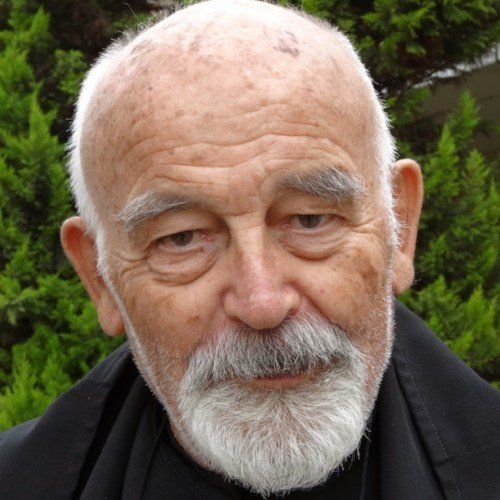
By Belmont Webmaster
•
14 Jan, 2020
Fr David's Requiem Mass was be celebrated on Tuesday, 14th January, at 2.30pm. A good number of people turned out including a number of Old Boys from the School. Abbot Paul presided, and Bishop Mark concelebrated. A Requiem Mass was also celebrated at the monastery of Lurin in Peru (see the photos below). Dom David Bird died on New Year’s Eve. Although he had been very frail for some time and unable to come down even for Mass, it still came as a shock that he had passed away. Fr David was a boy in the school and joined the monastery in 1955. In the 60s he was Fr Luke’s curate on the Belmont Parish. He taught in the school and served at Whitehaven before going out to Peru in 1981 with Fr Luke and Abbot Paul. There he served in many capacities for 37 years and was greatly loved by people both young and old. He returned to Belmont at the beginning of 2018 because of ill health. He was a good theologian, whose theological blog “Monks and Mermaids” was widely read all over the world. His great and gentle soul will be sadly missed by many. May he rest in peace. Abbot Paul writes of his life below. One of Fr David’s favourite stories was that of the Bolshevik army, with its commander-in-chief, arriving at a Siberian village in 1917. After haranguing the poor villagers for a couple of hours in the freezing cold on the glories of the Russian Revolution, he turned to the old parish priest, “And what answer do you and your God give to that?” The old man faced the crowd and cried out, “Christ is risen!” to which the villagers shouted back, “He is risen indeed!” That true story tells us much about Fr David’s life and faith. His whole being was centred on the Risen Christ, his Incarnation, Death and Resurrection. He lived and breathed Christ, For Fr David there was no other reality greater or more important. The Resurrection was the answer to all life’s questions, the answer to man’s search for God and his quest for meaning and truth. “Christ is risen! He is risen indeed!” John Patrick Bird was born to Cecil and Margaret Bird (née Hughes) at Stourport Hospital on 31st March 1937. His father was manager of Lloyd’s Bank, Bridgenorth. Before his second birthday, his parents moved to Hereford and it was here that John spent his formative years. His mother was a close friend of Sr Philippa of the Poor Clares at Bullingham. The nuns loved baby John and his mother would pass him into the enclosure by way of the turn, so that the nuns could cuddle and play with him. Could that have been the beginning of his vocation? It was at Hereford too that his sister Monica was born 9 years after John. When she was still a baby, John was sent off to school with the Salesian Fathers at Cowley, but he didn’t like it there, so, at the age of 13 he came to Belmont as a dayboy. When his parents moved to Stow in the Wold, he became a boarder. His father served in the army throughout the war and always said he much preferred the war to working in a bank! John was very much like his father. As he grew up, John developed a certain absentmindedness. Once when his trunk was sent home at the end of term, his mother was surprised, on opening it, to find nothing but a sock. On another occasion, his parents were waiting for him at the station. As one train after another came and went, they finally walked to the police station. Enquiries eventually led to the discovery that John was still sitting on the platform at Hereford station. He was so engrossed in his book he had forgotten why he was there. John loved reading and, when stuck into a book, became oblivious to what was going on around him. He was beginning to live in a world of his own. On finishing school, John remained at Belmont as a candidate for the monastic life. He never lived a normal life, never had to find work or hold down a job and never had the responsibility of providing for a wife and family. John was clothed as a novice on 28th September 1955 by Abbot Maurice Martin and given the name David. He made his Temporary Profession a year later and was solemnly professed on 29th September 1959. He studied for the priesthood at Belmont and was ordained on 1st June 1961, together with Fr Illtud. By now he was seriously interested in Theology and so he was sent study for a License with the Dominicans at Fribourg in Switzerland. In those days the teaching of Theology was done in Latin, but for everything else French was used, so David began to learn French. We don’t know how proficient he became, but he loved telling the story of his first sermon in French. It was given at a woman’s penitentiary in Paris to a large group of prostitutes. The only subject he could talk about in French was ecumenism, so that is what the poor ladies were subjected to. Bishop Mark, who was studying French Literature at Fribourg, remembers David rushing late into class carrying a large bottle of Chianti and leaving it on his desk. David was very open and straightforward. Nothing was hidden. He was innocent in so many ways. He loved wine, beer and whisky and was never without his favourite pipe. Fr David returned to Belmont and was appointed to teach Theology to monks in formation and Scripture and Divinity in the school. He also became curate to Fr Luke on the Belmont Parish. He loved his subject and enjoyed teaching, although he could never be relied upon to remember the day or the hour of a class. He was a popular School Chaplain; his caring, fatherly nature and his ability to listen in a non-judgemental way meant that he was sought after by many of the boys and girls as a confidante, advisor and confessor. David was always fun to be with and his room in the school, smelling of toast and coffee, was always full of young people talking loudly and discovering their faith in a positive, happy way. Some thought he was rather avant garde, yet his Theology was soundly orthodox and traditional. The wonderful tributes from old girls and boys are a moving testimony to the lasting effect Fr David had on their lives. It was Bishop Daniel Mullins, who said that what made Belmont such a good school was the fact that so many of its former pupils had kept the Catholic faith. Fr David was a keen ecumenist, forging relationships with Anglicans and Orthodox. He was lovable and eccentric. Long before health and safety and low cost airlines, he organised pilgrimages to Chartres and Lourdes, usually combined with a week on the Costa Brava. They travelled by train, often having to go from one station to another by traipsing across Paris and invariably getting lost. On one occasion a group of 30 boys woke up at crack of dawn to find themselves camped on a traffic island surrounded by rush hour traffic. On another, in a hurry not to miss the train, one of the boys picked up what he thought to be the big communal tent. No one took notice until, half way to Toulouse, Fr David asked where it was. A boy pointed not to a tent but to a mailbag. Out of fear, a window was opened and the mailbag thrown out. Boys constantly got lost, but on one occasion, when a boy lost his passport, David simply wrote the boy’s Christian names in his own passport, declaring at the Spanish border that the boy was his son. As ever, he got away with it. You have probably heard the apocryphal story of his burning down a monastery in Austria. The truth is, it was only a wing of the monastery! In 1978, Fr David was asked by Abbot Jerome to join Fr Luke at St Begh’s, Whitehaven, as assistant priest. In those days monks were not consulted on their appointments. Fr David returned from holiday to find a letter from the abbot on his bed and that was that. Next day he packed his bags and went north. He enjoyed his three years in Cumbria, an experience that prepared him for the next stage of his life. In 1981, Fr David was chosen, together with Fr Luke and myself, to become a founding member of Peru’s mission in Peru. He was thrilled. He studied Spanish in Cochabamba, Bolivia, with the Maryknoll Fathers and finally arrived at Tambogrande on 20th August. Here he was to live and work for 9 ½ years. The Jesuit Archbishop Fernando Vargas, who had invited us, suggested we live in this small country town in order to get to know the Peruvian reality before actually founding the monastery. In fact, it was a vast parish of over 100,000 souls with 123 villages spread over 5,000 sq. km. Fortunately, the Sisters of Notre Dame and the Sisters of St Joseph of the Apparition were already there and together we trained an excellent team of catechists and volunteers. Through the hard work of Fr David and everyone else, it became a model parish. The people and their way of life fascinated David. For many years he produced a newspaper called The Tambogrande Times for our parishioners, friends and benefactors back in the UK. It included a regular column offering constructive criticism of Liberation Theology. Putting together this newssheet, he discovered his flair for journalism and his love of writing, skills he would develop later writing two books, The Royal Road to Joy, published in 2003, and Heaven Revealed, in 2008. With the advent of the Internet, he would produce a highly respected blog, “Monks and Mermaids.” At Tambogrande and the villages, which he visited on his motorbike, he dedicated himself to pastoral work, not only celebrating fiestas and the sacraments but praying with the sick and dying. Everybody loved Fr David, especially children, who would follow him around like he was the Pied Piper. He played games with them, made them laugh, spoke to them of the love of God, spent precious time with them and enthralled them with his imitations of farmyard animals. He visited schools, chatting with teachers and pupils, and was instrumental in the setting up several village schools, including a secondary school at Progreso Bajo. He was full of energy and enthusiasm, yet as absentminded and forgetful as ever. Although he returned to Cochabamba for a refresher course, he was never fluent in the language, often slipping from Spanish to English without realising it. When the time came to move to the Monastery of the Incarnation, built by Fr Mark in San Lorenzo, David asked to remain at Tambogrande, but on Fr Luke’s return to England, he was made parish priest of Cruz del Norte, Piura. Here, to the horror of Archbishop Oscar Cantuarias, he kept an open house for young men from Tambogrande who were studying or working in the city. You can imagine the noise and the chaos. Eventually, the Archbishop’s patience ran out and David had to go. He returned to England for a while and was sent to look after the parish at Harrington, but he was heartbroken and wanted to return to Peru. I pleaded with the Archbishop to let David back and he eventually relented, offering David the parish of Negritos, a coastal town 100 miles north of Piura. Here he worked for a number of years, enjoying the charismatic spirituality of the parishioners and the diet based on fish found locally in the Pacific. He was particularly happy in Negritos: he was his own boss and the Archbishop seemed a long way away. However, these bishops eventually catch up with you and, if they don’t like the way you are doing things, they ask you to leave. Archbishop Oscar and Fr David did not enjoy a happy relationship. God is good: when one door closes, another opens. Fr David was invited to the Diocese of Cajamarca to serve in the parish of San Miguel de Pallaques, high up in the Andes. This was a completely new experience, accustomed as he was to the deeply religious, affectionate and hospitable people of northern Peru. Nevertheless, he enjoyed his time at San Miguel. However, he was no longer a young man. He was now in his mid 60s and beginning to decline. His mind turned to the possibility of joining the monastic community that was relocating to Pachacamac, an hour south of Lima. However, before returning to the monastery, he worked for two years as a charismatic spiritual director in the formation house of a new Peruvian religious order at Chosica on the central highway. He finally came to the monastery in 2007 and was appointed superior in 2008, a position he held with the faithful support of the Peruvian brethren until 2016. One of his many extraordinary feats was the erection of the largest and tallest Cross of St Benedict in the world on the mountaintop behind the monastery, a task accomplished with the help of Peruvian Air Force helicopters. On a visit to England, he was diagnosed with Non-Hodkin’s Lymphoma, which necessitated protracted treatment with chemotherapy. He was distraught, but eventually, he returned to Pachacamac, dedicating himself almost exclusively to his blog and corresponding with theologians all over the world. By the end of 2017, it was clear that Fr David’s health made it impossible for him to remain in Peru. So it was that in February 2018 I met a downcast Fr David at Birmingham airport. He settled remarkably well to life at Belmont, but dreamt only of returning to his beloved Peru. He knew and we knew that this was not to be. To begin with he continued working on his blog and kept contact with brethren and friends in Peru, but gradually his health deteriorated and he was unable to do very much, other than pray, read and watch old films on his laptop. His lifeline was Monica’s regular visit on a Saturday night to deliver his supply of whisky and take him out to the Three Horse Shoes. His dying wish was to go to the pub with Monica. After three years of grace, the cancer had returned and this time there was no turning back from the road that leads to God through the gateway of death. Early on New Year’s Eve, he passed peacefully into the life that lies before us all. As St Paul reminds us, writing to the Romans, “All of us who possess the first-fruits of the Spirit, we too groan inwardly as we wait for our bodies to be set free.” May his gentle soul rest in peace. Amen.
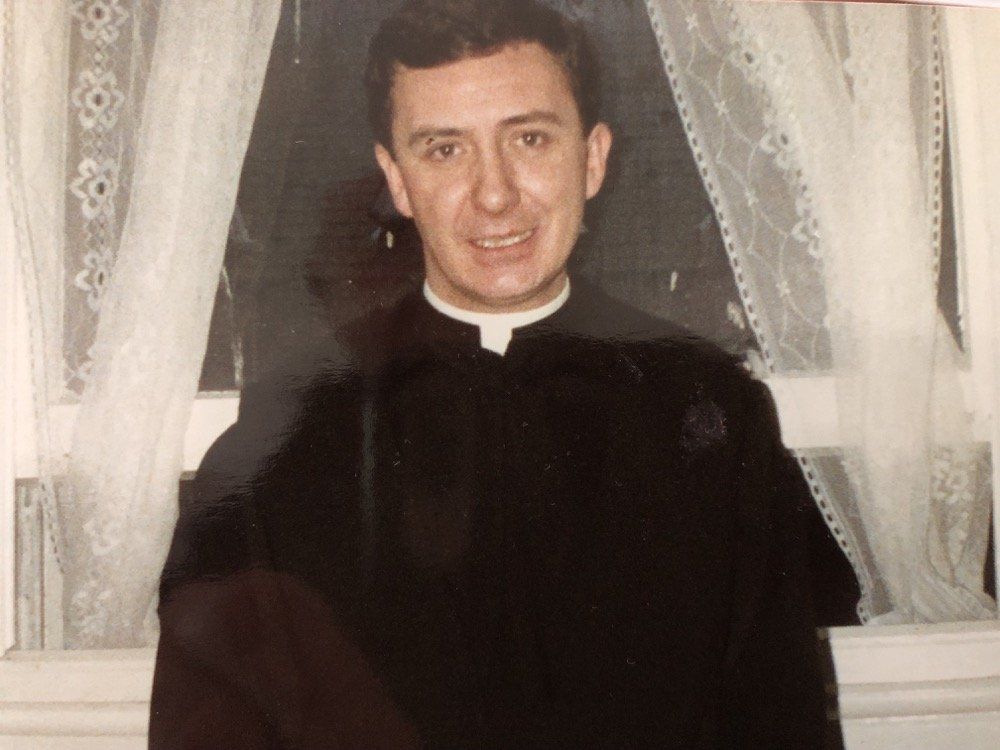
By Belmont Webmaster
•
27 Jun, 2019
Abbot Paul preached the following Homily at the Requiem Mass of Dom Aidan on 27th June 2019. The Church was full for the occasion: Dom Aidan had been a much-loved Parish Priest at Whitehaven, Brynmawr & Abertillery and Leominster & Bromyard. Fr Aidan thought St Paul to be a genius, because the things he wrote in his Epistles seemed to apply directly to him. This was particularly true in his last years of intense and relentless physical pain and mental anguish, In his letter to the Romans, St Paul said that, “What we suffer in this life can never be compared to the glory, as yet unrevealed, which is waiting for us. From the beginning until now the entire creation, as we know, has been groaning in one great act of giving birth, and not only creation, but all of us who possess the first-fruits of the Spirit, we too groan inwardly as we wait for our bodies to be set free.” Aidan often said that those amazing insights of St Paul described exactly the way he felt about his own life as a Catholic, a monk and a priest, but above all as a human being with so many crosses to bear. But, as we all know, it was precisely that endless suffering and those many crosses that made him such a compassionate, devoted and loving friend and pastor. We pray today at his Requiem Mass that, despite his many frailties and flaws, just as he shared in the sufferings of Christ, so too he will now come to share in his glory, for he believed God to be infinitely merciful and good. Joseph James Doyle, son of Joseph John and Margaret Mary (nee Gibson), was born in Liverpool on 31st October 1955, the feast of St Aidan, whose name he would take later as a novice at Belmont. He was the eldest of three boys, whose mother died tragically when little Joe was just 5 years’ old. His mother’s cousin Peggy Riley and her husband Hugh took the little boys in and brought them up as their own children, giving them a happy home with all the love and affection they needed to help make up for the loss of their mother. Joseph was educated at St Sylvester’s Primary School and then at Liverpool Collegiate Grammar School, though he left at 16, having taken his CSEs. He worked as a clerk for three years at Jacobs Biscuit Company. Then, in 1975 he tried his vocation, entering the Franciscans and making his First Profession a year later. He was sent to study Philosophy at the Franciscan Study Centre in Canterbury, but did not persevere as a Franciscan and was dispensed from his vows on 20th December 1979. He then went into nursing and worked at the Royal Star and Garter Home, Richmond Hill, Surrey, where he became Chief Care Assistant. In 1982 he got to know the Belmont Community and on 25th September 1983 he entered the monastery as a Postulant, being clothed in the habit by Abbot Jerome on 7th December, taking the name of Aidan. From now on, he would be known as Brother or Father Aidan, though his family still called him Joe. On the Solemnity of the Immaculate Conception 1984, he made his First Profession and, in September 1985, after an unsuccessful attempt at studies at Oxford, he was sent to Rome to study Theology. He lived at Sant’Anselmo, but went out for classes to the Beda and the Gregorian. Here, as everywhere else, he made many friends and was particularly popular as a spiritual guide and mentor to a group of Carabinieri, whom he grew to love. I promised Aidan that I would make special mention of them in his panegyric. It was also in Rome that he began to experience not infrequent bouts of illness, especially chest infections. He made his Solemn Profession on 8th September 1989, Our Lady’s Birthday, at the hands of Abbot Alan and was ordained by Archbishop Ward, a Capuchin, at Belmont on 26th June 1992. His journey to the Priesthood has not been an easy one. You all remember his Silver Jubilee just two years’ ago. These were difficult years at Belmont, not that any of us can remember a year that hasn’t been difficult: the school, which was so much part of our life, would close in July 1994. Fr Aidan worked as Monastic Infirmarian, looking after the sick and elderly with professional care and deep affection, which the brethren greatly appreciated. He was also Monastic Guestmaster, work that would extend into Hedley Lodge when it was created as a monastic guesthouse on the closure of the school. Fr Aidan knew how to make guests truly welcome and it was in this capacity that I first met him on one of my visits home to Belmont from Peru in 1995. There was no room for me in the monastery, so I had the good luck to be one of his guests at Hedley. Life was always fun when Aidan was around: I don’t think I had ever laughed so much in all my life. He was, as you all know, a brilliant mimic and could tell a story like no one else. He could entertain you for hours on end. He would have made a fortune as a stand up comedian. In January 1997, he was asked by Abbot Mark to become assistant priest at St Begh’s, Whitehaven, where he fell in love immediately with the two churches, the parish, the town and its unique people. At Whitehaven he felt truly at home, and with Liverpool half way between Cumbria and Herefordshire, it meant that he could visit Auntie Peggy and his family on his frequent visits to Belmont. He was a wonderful pastor, who took special care of the sick, dying and bereaved. His prayers were much appreciated and his words of encouragement were filled with genuine compassion and love. Those who met him or welcomed him into their homes or in hospital, were always left feeling healed and touched by God and Our Lady, to whom he had the greatest devotion. He was truly a child of Mary. Now Fr Aidan could have been a professional interior decorator. There was nothing he liked better that the challenge of decorating and furnishing a house and church. What his tastes lacked for in sobriety and delicacy, they certainly made up for in colour, flamboyance and flair. The same went for his love of furnishings, curtains and vestments. Wherever he went, he left an indelible mark. Then, of course, there were his flower-arranging skills. People came from all over the North of England to see his exotic flower displays at St Begh’s. In January 2001 he was appointed Parish Priest of St Begh’s, but in 2003, on the feast of Our Lady of Lourdes, Fr Aidan was hospitalised with a serious chest infection. Eventually, the weight of administration and recurring chest infections, not helped by his addiction to tobacco, got the better of him and he offered me his resignation in 2005. There was also, of course, his ongoing struggle with alcoholism: although a faithful member of AA, there were occasional lapses, but he was a fighter and not easily overcome, especially when he set his mind to it. After a year’s convalescence, in 2006 he was appointed Parish Priest of Brynmawr and Abertillery in the Welsh valleys at the invitation of Archbishop Peter Smith. He was to remain here for 6 years, some of the happiest in his life, his ministry being fruitful and extensive. He loved the school and had a special gift of explaining the faith to children, parents and teachers alike. He would have made a wonderful father. However, there were worrying periods of illness, above all the recurring chest infections. He was greatly loved and appreciated and, although very Catholic and traditional, he always had excellent and respectful ecumenical relations with other churches and ministers. Needless to say, here too he lavishly decorated the house and churches. In 2013 he was appointed Parish Priest of Leominster and Bromyard, where once again his pastoral skills and attractive personality endeared him to everyone and it was here, in rural Herefordshire, that he found the special companion he needed to fulfill his priestly ministry and support him in his declining health, his beloved Westie, Hugo, named in honour of his revered Fr Hugh, with whom he had worked in Whitehaven. Hugo and Aidan were inseparable, both finding the joy of friendship in each other. One of the important things he achieved in Leominster was to encourage devotion to the Herefordshire martyr, Blessed Roger Cadwallador, whose relic is on the altar here today. However, in 2016, the dark shadow of cancer moved across his life, when Fr Aidan was discovered to have a tumour in the bowel. Despite protracted bouts of chemotherapy, the cancer spread to his liver, where two further tumours were discovered. This led to more chemotherapy that made his life a misery. There appeared to be a glimmer of hope, the possibility of surgery to remove the tumours, now reduced in size, but he was too frail to face surgery and the chest infections became more persistent. A special word of thanks must go out to the nurses and doctors who tended him in Leominster, St Michael’s Hospice and Hereford Hospital and to parishioners of both parishes, who looked after him and Hugo with such tender loving care. Mercifully, the end came quickly, just a week after being told that surgery was out of the question and that the tumours were returning with vigour. He had always lived in the hope that surgery would bring him back to health, so that he could return to his priestly duties. It was not to be. God, in his infinite wisdom and mercy, had other plans. On Sunday, 26th May, he was anointed for the last time, though by now he was unconscious, and on Monday morning, Solemnity of St Augustine of Canterbury, he died peacefully with Auntie Peggy, his brother Nicholas, his nurse Tina and his beloved companion Hugo nearby. At long last, the painful years of protracted suffering were at an end. Not once was Fr Aidan ever heard to complain, although he was often frustrated and exhausted by it all. His love for God and Our Lady never waned and he was an example to us all of patience and fortitude. He was always more concerned for others than for himself. In today’s Gospel passage Jesus said, “If a man serves me, he must follow me, for where I am, there will my servant be.” May his loving soul rest in peace and may there be rejoicing among the angels and saints as he journeys through Purgatory towards the joys of Heaven. Amen.
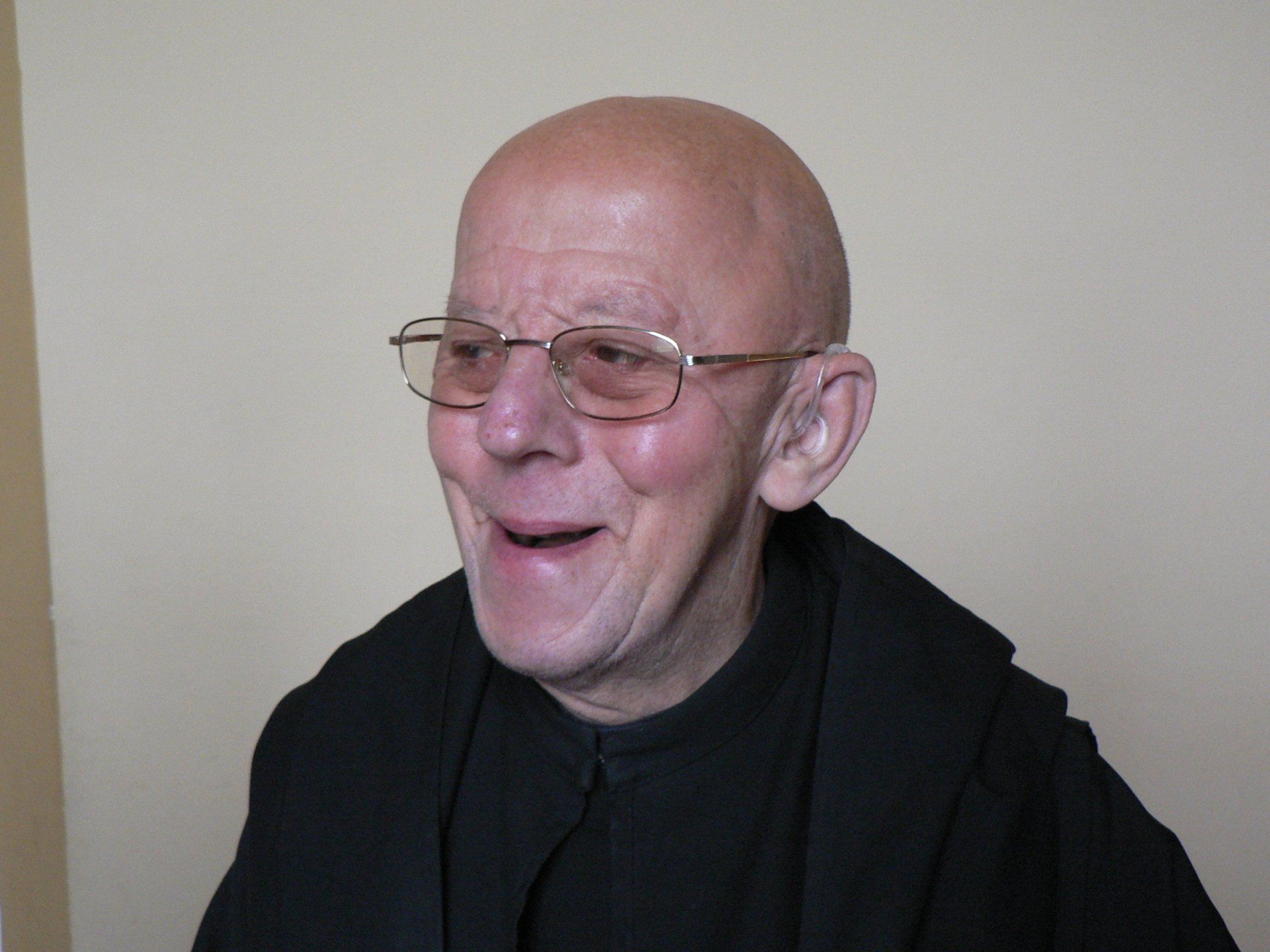
By Belmont Webmaster
•
19 Sep, 2018
The community were joined by a large congregation on 19th September 2018 for the Requiem Mass and burial of Fr Cadfan (David Williams) who died unexpectedly at the age of 81. Among the mourners, Bishop Mark Jabalé, former Abbot of Belmont was present and the current Bishop of Hereford, Richard Frith representing the Dean Michael and Cathedral community at Hereford and the Reverend Sue Adeney representing Dean Peter and the Cathedral community at Worcester. After the Requiem Mass, the mourners attended the burial in the monastic cemetery. Abbot Paul preached the homily which is reproduced below. Eternal rest, grant unto him O Lord, and let perpetual light shine upon him. May he rest in peace.
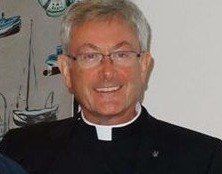
By Abbot Paul Stonham
•
06 Jul, 2018
When Dom Antony Tumelty died at the Marie Curie Hospice in Penarth on the afternoon of 27th August 2017, he was only 63 years’ old. He had suffered with cancer for a long time and had fought valiantly against ill health. We are deeply indebted to the staff at Velindre Cancer Hospital, Cardiff, and to his brother John for the wonderful care given to Fr Antony in the last three years of his life. Peter Tumelty was born in Cardiff on 21st April 1954, the younger son of John and Isabella Tumelty, and was educated at St Illtyd’s College, taking a great interest in dramatic arts. He came to Belmont in 1974, being clothed on 28th September, together with Br Francis McKenna. They was solemnly professed by Abbot Jerome Hodkinson on 29th September 1978, studied for the Priesthood at Allen Hall in London and were ordained together on 21st March 1980. They are now buried together at Belmont. Fr Antony studied Drama at the Welsh School of Music and Drama and was both a great actor and a successful director of plays and musicals. He was the much-loved Housemaster of Vaughan until the closure of the school in 1994, when he moved to St Francis Xavier, Hereford, as assistant to Fr Christopher Jenkins. Not long afterwards, his health deteriorated. After prolonged treatment in and out of hospital, he was appointed Chaplain to the Poor Clares at Much Birch, where the nuns made a small flat for him in the guesthouse. He also served as Chaplain to the Armed Forces in Herefordshire for 10 years. He was much sought after as a confessor and had a particular empathy for those suffering bereavement. He grew to love the Extraordinary Rite of the Mass and celebrated it as often as he could, encouraging others to do the same. He had a rare wit and was always entertaining, even when feeling very unwell. Until the last few weeks of his life, his acting skills, devilish sense of humour and deep love for others helped him camouflage his suffering and pain. He accepted God’s will with exemplary faith, courage and humility. Requiescat in pace.
Our Monastery
Belmont AbbeyRuckhall LaneHerefordHR2 9RZ
Phone: 01432 374710E-mail:
Enquirieswww.belmontabbey.org.uk
HOW TO FIND US
Copyright 2018 © Belmont Abbey. All rights reserved | “Belmont Abbey General CIO (registered charity number 1190035).
Principal office: Belmont Abbey, Ruckall lane, Hereford HR2 9RZ.”
Principal office: Belmont Abbey, Ruckall lane, Hereford HR2 9RZ.”
Website developed by:
Every Day Christian Marketing Ltd

